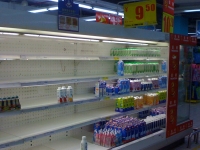New Zealand Dairy Exporter Admits Third Contamination Scandal

Fonterra, a New Zealand company and the world's largest dairy exporter, has apologized for exporting a milk formula ingredient contaminated with potentially toxic bacteria. The incident comes six years after a company subsidiary in China sold contaminated baby milk formula that killed six infants and made thousands more ill.
Created by the merger of New Zealand Dairy Group and Kiwi Co-operative Dairies, under a special law passed in 2001, Fonterra has a virtual monopoly over the dairy farming in New Zealand. It is also the largest company in the country with over $15 billion in revenue and contributes over a quarter of the country's export earnings.
In late July the company disclosed that clostridium - a toxin associated with botulism - had been detected in tests on 38 tons of whey protein concentrates that had been exported to Australia, China, Malaysia, Saudi Arabia, Thailand and Vietnam.
China, Russia and Vietnam reacted by imposing bans on several company products.
Chinese consumers who prefer the New Zealand brand were very upset. "Domestic brands aren't very good. Now, neither are foreign brands," Zheng Zhiqing, who was buying formula for his grandson in Shanghai, told Reuters news agency. "I have no idea how I should choose."
For Fonterra, the Chinese ban was particularly devastating as the country is the company's biggest customer. Some 90 percent of China's milk powder sales, worth $1.9 billion a year, is imported from New Zealand, mostly from Fonterra.
Theo Spierings, Fonterra's CEO, immediately flew to Beijing to apologize. "We really regret the distress and anxiety which this issue could have caused," he told reporters at a press conference that was broadcast live. "We totally understand there is concern by parents and other consumers around the world. Parents have the right to know that infant nutrition and other dairy products are harmless and safe."
The news brought back memories of Sanlu, a Fonterra subsidiary in China, which sold infant formula containing melamine, a nitrogen rich chemical, in 2007 and 2008. The New Zealand company admitted that one of its board members had provided Sanlu with a European Union document that specified the maximum levels of melamine allowed in food.
After thousands of children fell ill with kidney problems and six died, tests showed that Sanlu's Beibei infant formula had 2.5 grams of melamine per kilogram of formula.
Fonterra insists that it told Sanlu at the time that melamine should not be added to infant formula. "I do want to be crystal, crystal clear - although there was lots of information that was pulled up we were vividly clear to Sanlu that the only acceptable level was zero," Andrew Ferrier, the company CEO at the time, told the New Zealand Herald newspaper.
Sanlu chairwoman Tian Wenhua was sentenced to life imprisonment for her role in the disaster and three other executives were also given lengthy jail sentences. The company went bankrupt earlier this year.
Last September, Fonterra came under scrutiny again, when residues of 2-Cyanoguanidine, a nitrile fertilizer, were found in whole milk powder, skim milk powder and buttermilk powder exports.
The disclosure that clostridium had been detected in whey protein concentrate was compounded by the fact that the company said that the contamination took place in May 2012 and had gone undetected for over a year.
Some of the harshest criticism of the company has come from its own country.
"Our patience with Fonterra is running out. The botulism scare is one too many, but being kept in the dark too long for a third time on a food safety issue is simply not good enough," wrote Andrea Fox, a New Zealand farming journalist. "It is time to ask if Fonterra's size makes it vulnerable to systemic problems like an overlooked dirty pipe. And it is time to ask if Fonterra's size has bred a culture of arrogance and a sense of entitlement to decide it knows best what is good for us to know."
- 182 Health



